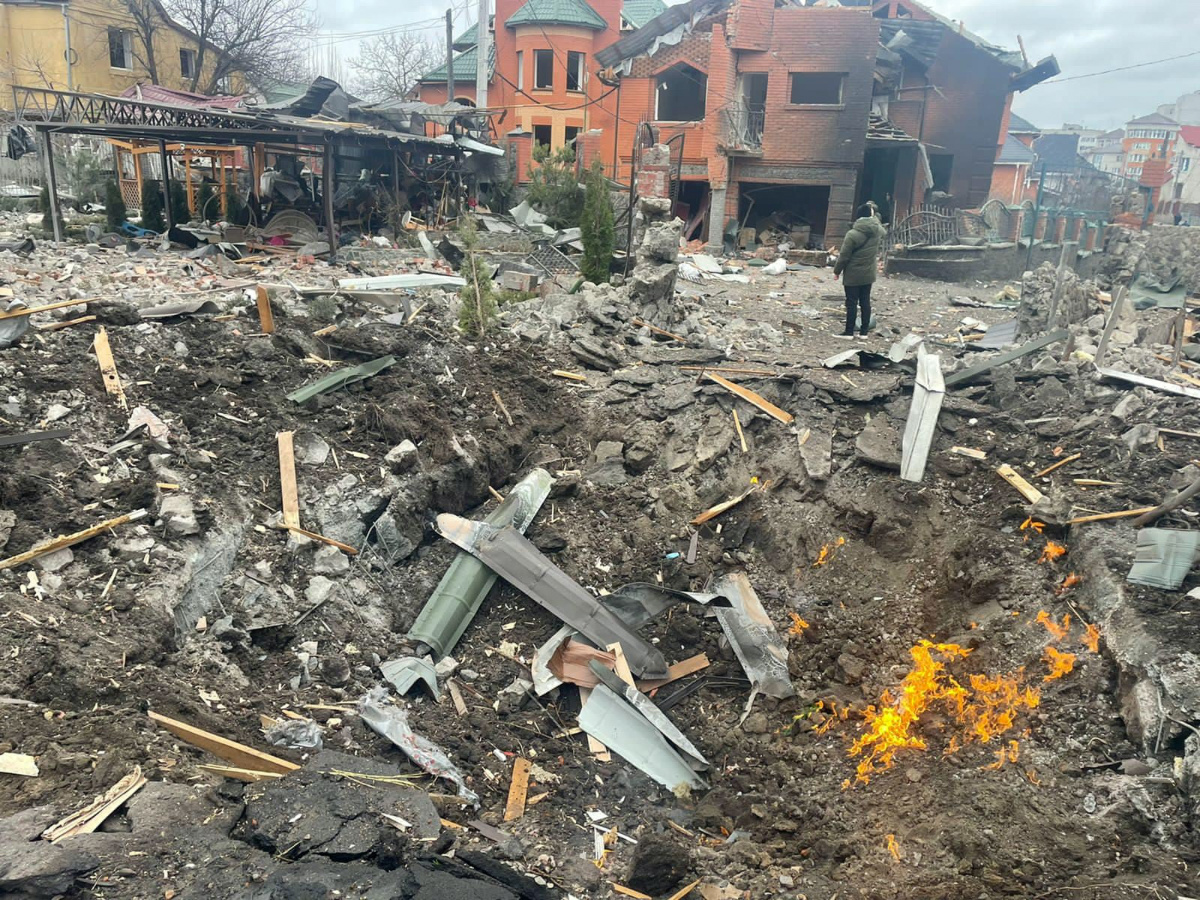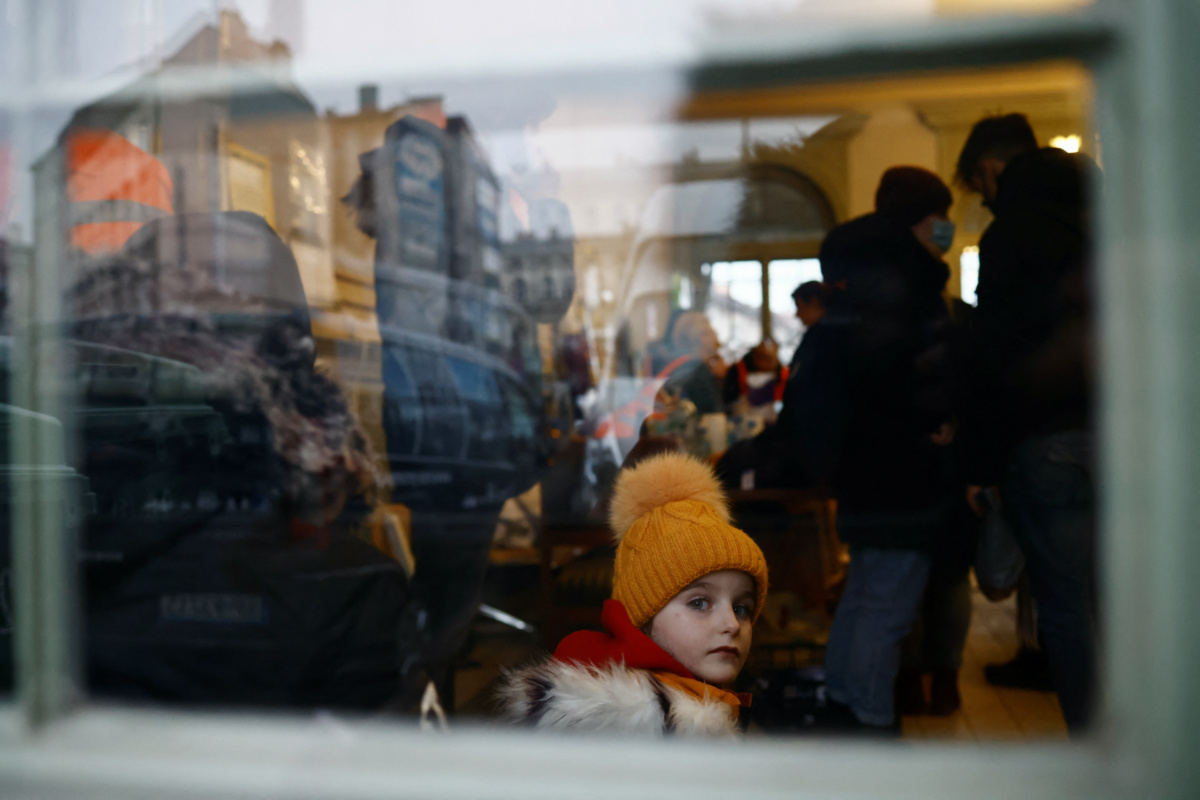Lviv/Kyiv, Ukraine
Reuters
Russian President Vladimir Putin said Western sanctions were akin to war as his forces pressed their assault on Ukraine on Saturday for a 10th day and the IMF warned the conflict would have a “severe impact” on the global economy.
Moscow and Kyiv traded blame over failed plans for a brief ceasefire to enable civilians to evacuate two cities besieged by Russian forces. Russia’s invasion has already driven nearly 1.5 million refugees westward into the European Union.

Debris are scattered around the hole in a road at the site where several houses have been damaged by an explosion, following an air strike in Bila Tserkva, Kyiv Oblast, Ukraine, on 5th March, in this picture obtained from social media. PICTURE: Kyiv Oblast Police/Handout via Reuters.
Ukraine’s President Volodymyr Zelenskiy made a “desperate plea” for eastern Europe to provide Russian-made aircraft to his country during a video call with US senators on Saturday, said the chamber’s majority leader, Chuck Schumer.
NATO, which Ukraine wants to join, has resisted Zelenskiy’s appeals to impose a no-fly zone over his country, saying this would escalate the conflict outside Ukraine. But there is strong bipartisan support in the US Congress for providing $US10 billion in emergency military and humanitarian aid to Ukraine.
PLEASE CLOSE THE SKY SAY UKRAINIAN REFUGEES
Ukrainians fleeing into central European pleaded for Western nations to take tougher steps against Russia following Moscow’s invasion that has created more than one million refugees.
At the Medyka crossing, Poland’s busiest, along its roughly 500 kilometre border with Ukraine, refugees called for a no-fly zone over Ukraine – something NATO powers have so far ruled out on the grounds it would risk escalating the conflict beyond Ukraine.

A child looks out of a window in a temporary accommodation for refugees, after fleeing the Russian invasion of Ukraine, at the train station in Przemysl, Poland, on 4th March. PICTURE: Reuters/Yara Nardi
“Please close the sky,” said Solomiya Zdryko, 18, who fled from Lviv in western Ukraine. “I know that it’s not possible for us to join NATO but at least close the sky because people are dying.”
“It’s great that the whole world is watching us and supporting us, but it really needs to stop.”
The number of refugees could potentially rise to 1.5 million by the end of the weekend from a current 1.3 million, according to the head of the U.N. refugee agency, Filippo Grandi.
“This is the fastest moving refugee crisis we have seen in Europe since the end of World War II,” Grandi told Reuters in an interview.
Poland, whose Ukrainian community of around 1 million is the region’s largest, has accepted nearly 800,000 Ukrainian refugees since the start of the Russian invasion on 24th February, Deputy Minister of Internal Affairs Paweł Szefernaker told reporters. More than 106,000 arrived from Ukraine in the last 24 hours, the highest figure since the war erupted.
Most escaping Ukrainians have crossed into the European Union in eastern Poland, Slovakia, and Hungary and northern Romania.
Hungarian Foreign Minister Peter Szijjarto said that 140,000 people have crossed into his country since the start of the war.
The government in Romania – where nearly 200,000 Ukrainians have fled – was expected to approve a decree on Saturday to use a government buffer fund to finance the costs of housing an average 70,000 people per day for 30 days. But it wants EU help too.
“I have stated very clearly that this effort Romania is making cannot be sustained without asking for European Commission help through its financial and support mechanisms,” Interior Minister Lucian Bode said.
Bulgaria plans to extend financial support of 40 levs per day ($US22.36) per person for three months for those who file for protection, and to support hotel owners who have opened their facilities to host the refugees. Some 20,000 Ukrainians have entered Bulgaria, border police said.
With men of conscription age obliged to stay in Ukraine and help in the defence, it has been mostly women and children who have made the crossing.
Authorities and volunteers across central Europe have pitched tents to provide medical aid and process asylum papers at the borders, before helping Ukrainians find jobs and accommodation in bigger cities.
Officials said many of the refugees who have arrived so far had friends and places to go to but they worry further waves of Ukrainians would arrive with less and need more help.
Czech Interior Minister Vit Rakusan estimated 50,000 refugees from Ukraine had reached the Czech Republic as of Friday. The country does not share a border with Ukraine but expects to accommodate a large number of refugees.
Prague turned its Congress Centre into a big assistance centre for refugees coming to the Czech capital, with the mayor asking for Ukrainian-speaking volunteers to help settle the new arrivals.
US Secretary of State Anthony Blinken met in Poland on Saturday with Polish leaders before travelling to the border. He praised Poland for its response to Russia’s actions.
With Russian forces stepping up their attacks on Ukrainian cities, some refugees said that while they were grateful for the support they were getting, they wanted foreign powers to do more.
“They could do more only by closing the skies,” said a 33-year-old woman who arrived from Lviv and who gave her name only as Olha.
She broke down in tears when talking about family members she left behind in Ukraine.
“But I think that all countries have helped Ukraine very much and I am very thankful for their help.”
– ALAN CHARLISH, Medyka, Poland/Reuters
Putin said he wanted a neutral Ukraine that had been “demilitarised” and “denazified”, adding: “These sanctions that are being imposed are akin to a declaration of war but thank God it has not come to that.”
Ukraine and Western countries have rejected Putin’s arguments as a baseless pretext for invading and have sought to squeeze Russia hard with swift and severe economic sanctions on its banks, oligarchs and others.
Israeli Prime Minister Naftali Bennett met with Putin at the Kremlin on Saturday to discuss the crisis before then speaking to Zelenskiy, Bennett’s spokesperson said. Israel has offered to mediate in the conflict, though officials have downplayed expectations for a breakthrough.
Ukrainian negotiators said a third round of talks with Russia on a ceasefire would go ahead on Monday, although Moscow was less definitive. Two previous rounds were unsuccessful and Zelenskiy has said Russia must first stop bombing.
“Together we will all rebuild our state,” Zelenskiy told Ukrainians in a televised address Saturday evening. “My confidence in this is reinforced by the energy of our resistance, our protest”.
No evacuations
Earlier, the International Committee of the Red Cross had said planned civilian evacuations from Mariupol and Volnovakha were unlikely to start on Saturday. The city council in Mariupol had accused Russia of not observing a ceasefire, while Moscow said Ukrainian “nationalists” were preventing civilians from leaving.
Britain said the proposed ceasefire in Mariupol – which has been without power, water and heating for days – was likely an attempt by Russia to deflect international condemnation while it resets its forces.
The port of Mariupol has endured heavy bombardment, a sign of its strategic value to Moscow due to its position between Russian-backed separatist-held eastern Ukraine and the Black Sea Crimean peninsula, which Moscow seized from Kyiv in 2014.
Russia’s Defence Ministry said its forces were carrying out a wide-ranging offensive in Ukraine and had taken several towns and villages, Interfax news agency reported.
In aerial combat near Zhytomyr, about 100 kilometres west of Kyiv, it said, four Ukrainian Su-27 fighter jets had been shot down. Reuters could not independently confirm the report.
A United Nations monitoring mission said at least 351 civilians had been confirmed killed and 707 injured in Ukraine since the start of the invasion on 24th February, adding that the real figures were likely to be “considerably higher”.
The number of refugees could rise to 1.5 million by Sunday night from 1.3 million now, the UN refugee agency chief said.
Women and children, often numb with exhaustion, continued to pour into Poland and other neighbouring countries as well as into western Ukrainian cities such as Lviv.
“I’ve barely slept for 10 days,” said Anna Filatova, arriving in Lviv with her two daughters from heavily bombed Kharkiv, Ukraine’s second city near its eastern border with Russia.
“The Russians want to flatten Kharkiv…We hate Putin.”
US Secretary of State Antony Blinken, on a visit to Poland, met Ukrainian Foreign Minister Dmytro Kuleba at the border amid tight security to discuss the provision of weapons and efforts to isolate Russia and cripple its economy.
Blinken also met refugees staying in a disused shopping mall in Poland, which has taken in the vast majority of the Ukrainians forced to flee their country.
“My heart of breaking”
Russians, reeling from a 30 per cent fall in the rouble’s value in the past 10 days, money transfer curbs and the exit of Western companies from IKEA to Microsoft, expressed fear for their economic future.
“My heart is breaking,” said one shopper, Viktoriya Voloshina, in the town of Rostov on Saturday.
Another woman, Lidia, said: “Today my family and I are leaving Russia.”
The International Monetary Fund said in a statement that the conflict was driving world energy and grain prices higher.
“The ongoing war and associated sanctions will also have a severe impact on the global economy,” it said, adding that it would bring Kyiv’s request for $US1.4 billion in emergency financing to its board for approval as early as next week.
Russia’s Foreign Ministry accused Britain of “sanctions hysteria” and vowed tough but proportionate measures against British interests in Russia. Britain plans to tighten its laws to facilitate a crackdown on Russian oligarchs in London.
Italian police have seized villas and yachts worth at least $US153 million from four high-profile Russians put on an EU sanctions list, sources said on Saturday.
The conflict has also shaken international diplomacy over Iran’s nuclear program, one of the few areas where Russia and the United States had been working together to curb what the West suspects is an Iranian plan to develop nuclear arms.
Russian Foreign Minister Sergei Lavrov said on Saturday the West’s sanctions imposed on his country had become a stumbling block for clinching a nuclear deal with Iran.
Russia also warned the EU and NATO again to stop the “pumping of state-of-the-art weapons systems” into Kyiv, citing the risk to aviation and other transport communications, ministry spokesperson Maria Zakharova said, according to RIA.
Putin, in one of several decrees signed on Saturday, gave his government two days to draw up a list of nations engaged in “unfriendly acts” towards Russia, its news agencies reported.
“Fightng fiercely”
Ukraine’s Defence Minister Oleksii Reznikov said 66,224 Ukrainian men had returned from abroad to join the fight against Russia’s invasion.
Ukraine’s military said armed forces “are fighting fiercely to liberate Ukrainian cities from Russian occupiers”, counter-attacking in some areas and disrupting communications.
We rely on our readers to fund Sight's work - become a financial supporter today!
For more information, head to our Subscriber's page.
In Kherson, southern Ukraine, the only regional capital to have changed hands during the invasion so far, several thousand people demonstrated on its main square on Saturday.
“Kherson is Ukraine,” they chanted, demanding that Russian forces withdraw.
Eyewitnesses cited by Interfax said Russian troops fired automatic rifles into the air in an unsuccessful attempt to disperse the crowd. The soldiers later left the city centre, the eyewitnesses said.
– With reporting by NATALIA ZINETS in Ukraine, OLZHAS AUYEZOV in Almaty, Kazakhstan, MATTHIAS WILLIAMS in Medyka, Poland, GUY FAULCONBRIDGE and WILLIAM SCHOMBERG in London, UK, JOHN IRISH in Paris, France, FRANCOIS MURPHY in Vienna, Austria, DAVID LJUNGGREN in Ottawa, Canada, and other Reuters bureaus.






